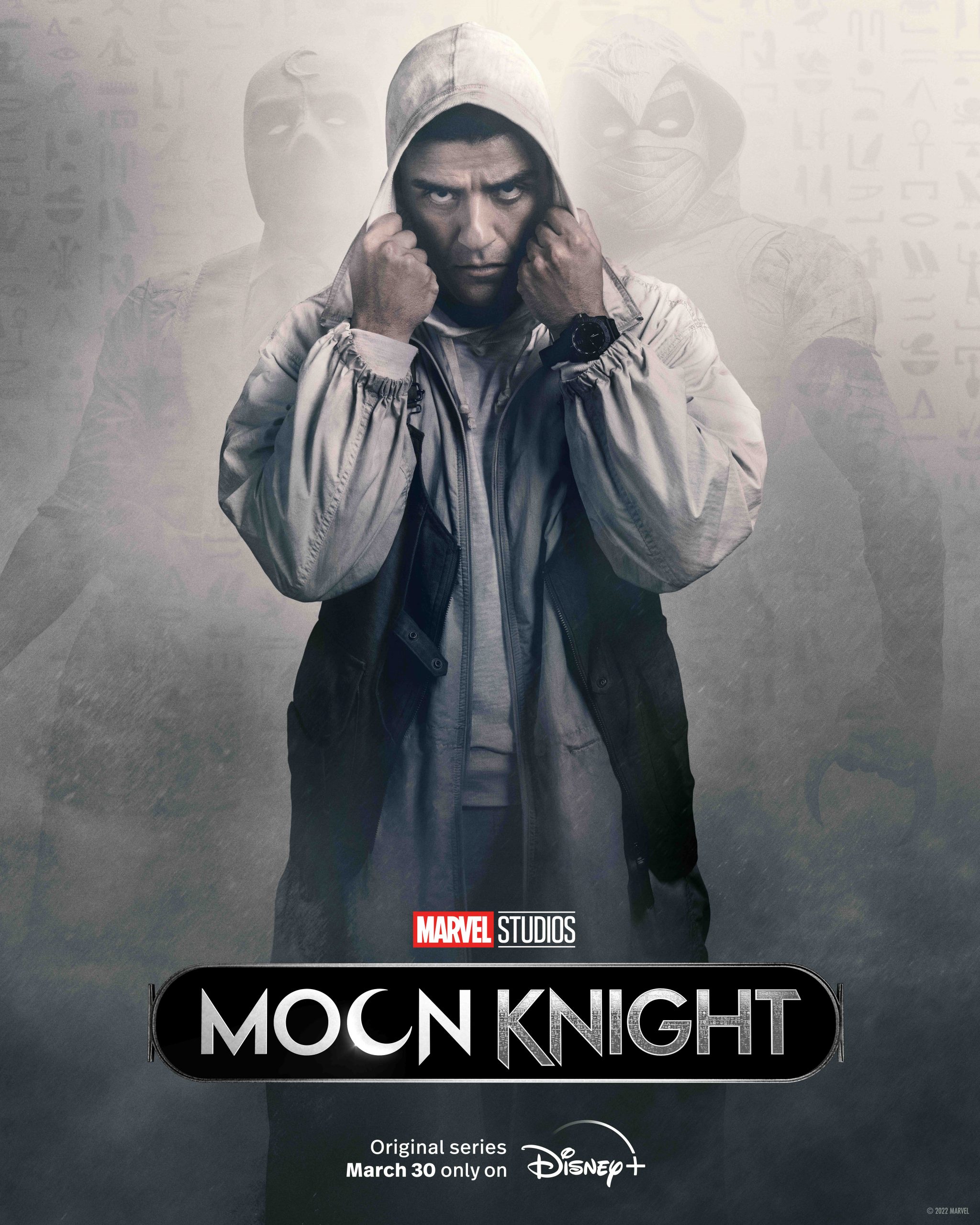The upcoming series Moon Knight is Marvel Studio’s latest television outing and a key new addition to the Marvel Cinematic Universe (MCU). The character is described as having been ‘on Kevin Feige [- President of Marvel Studios]’s radar from day one,’ and at long last is making his way to the screen. Last week, York Vision were invited along to the Moon Knight press conference, where its stars Oscar Isaac, Ethan Hawke and May Calamawy, directors Mohamed Diab, Justin Benson, Aaron Moorhead and executive producer Grant Curtis planted the seeds for the mythological mystery that is rocketing on to Disney Plus this week.
Moon Knight follows the story of museum gift shop employee Steven Grant as he is plagued by blackouts, out of his depth fight scenes and a surprise second personality, mercenary Marc Spector, as it is revealed he suffers from a dissociative identity disorder. A horror meets action meets Indiana Jones-style adventure, the series follows Marc/Steven as they navigate the complexities of sharing a body and the introduction of Egyptian gods into the MCU’s mythology.
Though it may seem an odd choice to be introducing Egyptian Mythology into the MCU, it is an introduction that is actually very fitting alongside Eternals, the forthcoming Thor: Love and Thunder and other globally beloved superheroes. Or as Moorhead put it, ‘Our great, modern myths are Marvel movies right now.’
With the show primarily being a character study for Marc and Steven, much discussion was given to the complexity of the role that Isaac faced in playing two unique characters. The task was something that required him to call in his brother Michael Hernandez for assistance. “So he came in and would play either Steven or Marc… (it) was really helpful to have someone that’s not only a great actor but also shares my DNA to play off of.”
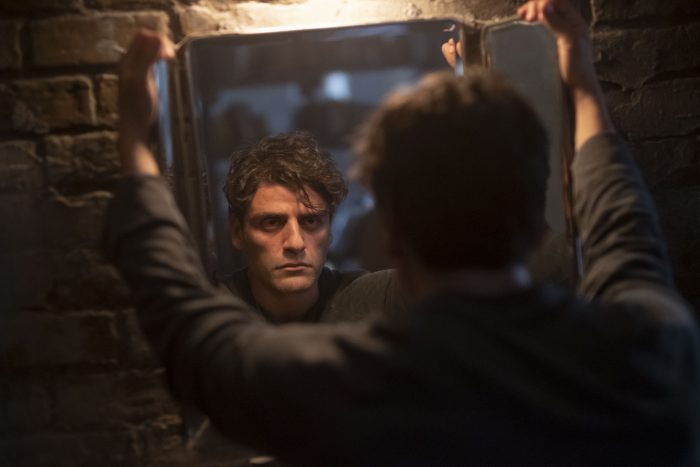
Isaac lists inspiration behind the sweet, bumbling British character Steven, citing the likes of The Office, Stath Lets Flats and Karl Pilkington from An Idiot Abroad. American mercenary Marc is the counterpoint, which Isaac describes as “the tortured dark vigilante guy but what makes him so special is that he has a little Englishman living inside him.”
His coworker Calamaway described a visceral difference between Isaac’s performance as the two characters. “And when he would be each character, it was really two separate people, and I could feel the energy… It was so fun to work with you and experience that.”
Audiences really gain a first-hand perspective of the complexity of the dual identities, with Isaac elaborating, “You’re in the skin of this guy and you’re seeing things happen … there’s something that’s terrifying about that.” Hawke further highlights “the skewed point of view.”, that with such an unreliable narrator as the lead protagonist, the opposite antagonist may not be exactly what he seems.
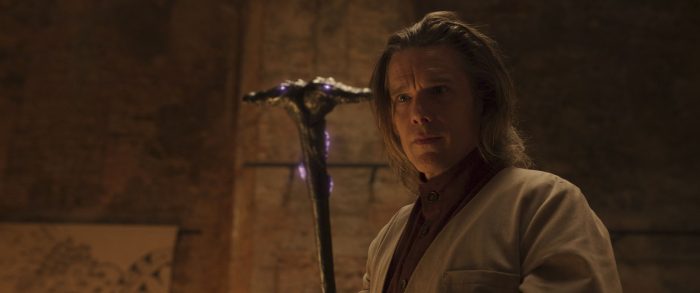
This creates a puzzling process for the creation of Hawke’s villain, “saint” Arthur Harrow. He notes that in the history of film mental illness is usually equated with the villain, whereas Moon Knight inverts this system, “so I have to kind of find a sane lunatic or a sane malevolent force.” Hawke is able to easily reshape his character, with Harrow’s comic-self being only a minor character, appearing once in the 80s.
Calamaway’s character, Laila Al-Faouly is seemingly an original creation for the show. That said, she is a definitive protagonist so far; an archaeologist and adventurer, drawn into Marc’s troubling past and future. She explains playing “this full gamut of a woman with her because she’s strong and she’s for the people and fights for what she believes, but she’s also really vulnerable and scared.”
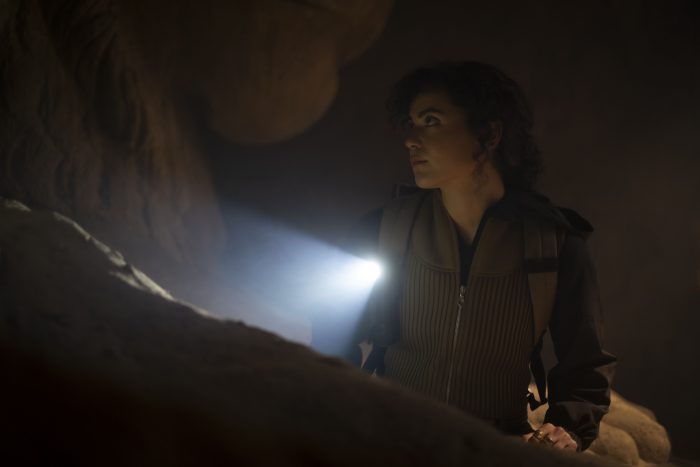
She was also able to authentically incorporate part of her own Middle Eastern heritage into the character and as Hawke emphasised “pushing to make her a three-dimensional person.” Hawke further praised Calamaway’s persistence in fighting for Laila in a “very male-driven rehearsal room”, to which Calamaway responded, “I’m lucky that you were all fighting for Layla, as well.”
This level of teamwork and collaboration shone throughout the event, with the participants eager to praise their colleagues and highlight the combined effort that brought the show into being, as well as Diab being keen to note that this approach had resulted in Moon Knight holding the record for the Marvel Studios’ project with the least additional photography.
Hawke was impressed by Marvel’s allowance of creativity, instead of controlling their big-budget shows, he says they translate “success into confidence and the confidence to – ‘yes, we are going to cook in your kitchen,’ but if we stay in the kitchen, we can do what we want.”
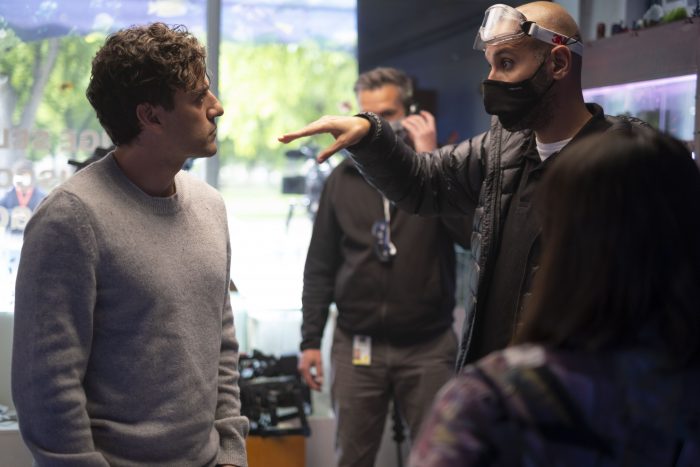
Executive Producer Grant Curtis in turn was thankful for the leading directors on the project, particularly Egyptian director, Mohamed Diab, who “brought so much authenticity to the storytelling, it’s immeasurable.”
Hawke noted the passion to contribute – with Isaac nailing the concepts of the character and Diab bringing the architecture of Egyptian mythology, “it brought our collective imagination into one thing.”
Even the beautiful Moon Knight suit was the work of a powerful collaboration of people, including an array of craftspeople, decades of comic illustrators, the creative crew and Moon Knight himself, Oscar Isaac. Diab described this immense effort “you always think – why work with one mind when you can work with 50, you know and it really shows in that suit.”
And even though it is a departure from the style most often used in the comics, Moon Knight’s suit is arguably the best it has ever looked. Identifying and honing in the elements which make the character unique and as a consequence making something that is also totally unique in the MCU.
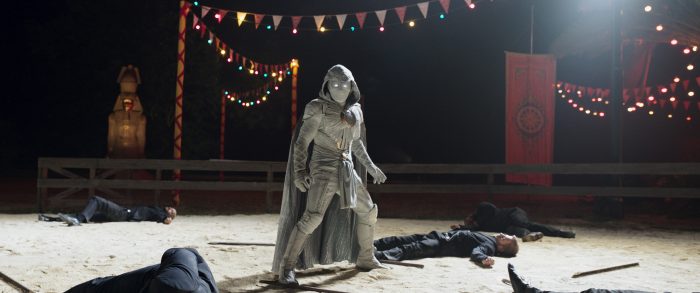
Tonally, Moon Knight stands apart from the rest of the MCU. Diab describes its genre blend, “You have horror, you have action, you have comedy, and you have very serious drama. It all blends in a very good way.” And it does. The close collaboration of the cast and crew has resulted in a very tight show, which feels consistent even when tonally the show shifts constantly.
For Diab, Moon Knight was his opportunity to push back against Hollywood’s depiction of Egypt, and the Middle East more widely, as “orientalism, when you see us as exotic and dehumanised.’ For him, it was incredibly important, ‘just showing us as a human, just normal human beings, through Laila’s character and seeing even Egypt as Egypt.” His way of doing that was by showcasing Egyptian humour. “Egyptians are funny in the most dire situations. So in a funeral, we’re gonna crack a joke.”
Benson points out how it was a perfect fit for Marvel because, just as in the Lemire and Smallwood run on Moon Knight, the “cheat to finding the humanity in characters is have them crack a joke in a stressful situation.”
Interestingly enough, the Lemire and Smallwood run is the only comics referenced during the press conference, but it’s clear to see why they pick that one out. The 2016 run’s take on Moon Knight is one that sees the closest examination of Marc’s dissociative identity disorder (DID), which is certainly the most central part of Marvel Studios’ adaptation of Moon Knight.
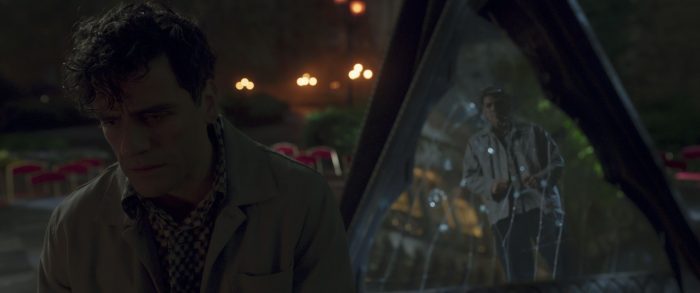
Isaac says that for him, “it just seemed like there was a real opportunity to do something completely different to use Egyptian iconography and the superhero genre and this language to talk about this real internal struggle this person is having.”
Diab explains that before he began making the show he felt ignorant about DID due to its normal representation in the media, “but what I learned through the journey of doing the show is that the character needs to live with themselves, the identities.”
Isaac builds on that idea, saying that Marc and Steven’s biggest power is “to live through abuse or trauma and survive it and then come to terms with that, as opposed to push it all away. And to see that journey happen, I think that’s a really powerful thing.”
Diab posits that the powerful thing about the show is that we can all learn from that journey. “What I learned from Marc and Steven is I need to be the same. I need to be one person. And I think this is the struggle that all of us through the journey of living are trying to achieve.” Isaac sums it up in one word: “Integration.”
Moon Knight Episode 1 is streaming on Disney+ from March 30th.
